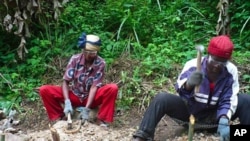A race is on led by U.S companies and non-profits to provide clean water for the nearly one billion people in the world who lack this access, many of them living in Africa. Our correspondent has more on some of the different methods being pursued.
Dramatic music accompanies video of Bayaka people running through endangered jungles in a southwestern part of the Central African Republic on the website of the U.S.-based group Charity Water.
The group's founder former nightclub promoter Scott Harrison explains his new quest as he drives down a dirt road toward a recently drilled water well in the village of Moale.
"We have now helped more than one million people in 16 countries around the world get clean and safe water to drink," said Harrison. "Every year, to celebrate our anniversary, we launch the September campaign to focus in on one of those countries and really make a dent in a specific region."
Another high-profiled U.S. non-profit called Water.Org, co-founded by Hollywood actor Matt Damon, has donation-based clean water access programs in Ethiopia, Ghana, Kenya and Uganda.
Back in a supermarket in the United States, a sales representative for the U.S. company Hydros demonstrates a portable and reusable filter bottle which reduces chlorine and other unwanted particles from U.S. tap water.
One dollar of the $30 bottle goes toward a water infrastructure project in Gundom, in a remote part of northwest Cameroon.
Twenty-four year-old Jay Parekh is the Hydros chief operating officer. He underlines the sustainability of the project, a gravity-fed water storage system from two locally protected mountain springs.
"It is what we call appropriately designed, using appropriate technology," said Parekh. "So we are working with village masons and village plumbers who already understand how to build concrete structures. They have already built their houses and the church and the schools and so what we are designing and building there is something that they are very comfortable with if anything needs to be repaired in the future."
Villagers have been using some of their freed up time they used to spend fetching water working on arts and crafts they sell in a nearby town, while children have had more time to go to school. Parekh says water-borne diseases are down noticeably.
Gundom villagers had approached Parekh, a former University of Pennsylvania student, when he had been working on a similar project several years ago with the group Engineers Without Borders in a nearby area.
"For me, the global water crisis is I think the single largest problem and threat facing humanity and I personally feel there is not enough attention around it," he said. "And so, having done water infrastructure throughout my undergraduate career it was a no-brainer for me to latch on to this cause, which is one that I want to eventually be a part of the solution for."
Parekh says for the long-term Hydros is also looking at coming up with a high performance filtering system which would work for tap water in urban areas of developing countries.
That is another race which is on, involving many different inventions trying to turn any dubious water into drinkable water.
Eugene Cloete has been developing one of these efforts in South Africa at the Water Institute of Stellenbosch University.
"The technology was developed in our laboratories and it relies on the use of a water bottle that can be reused over and over and inside the water bottle we have a filtration system," said Cloete. "The filtration system is very much like a tea bag. The tea bag then is filled with activated carbon and also some fibers, some nano-fibers in there which assist with the filtration process removing all harmful bacteria and other microorganisms."
Similar products like the Danish flute-like LifeStraw remove most but not all bacteria. Some critics have described the filter-based solutions as too expensive for poor people to afford themselves. Development experts also point out they do not solve the problem of access to water.
But they say the current race to widen access to clean water is creating beneficial competition and new ideas for those who need it.
US Companies Race to Provide Clean Water in Africa










